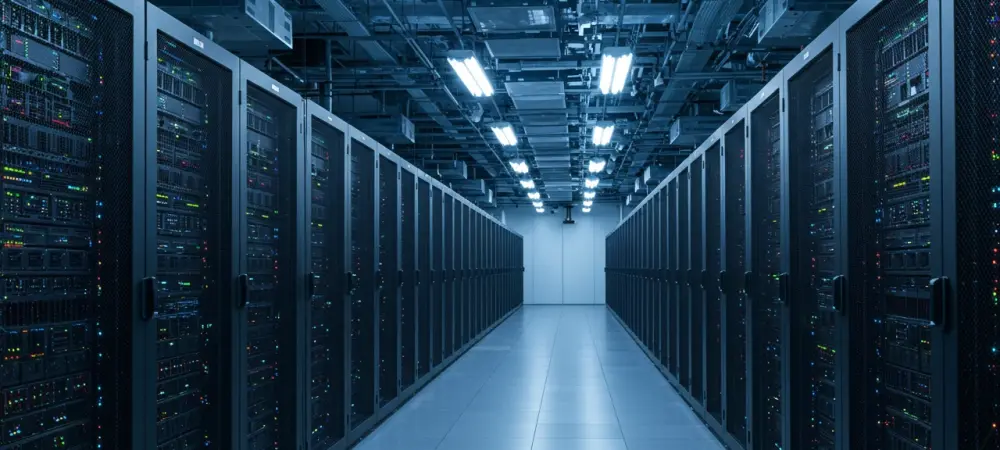Germany’s data center market stands at the intersection of technological evolution and infrastructural challenges, facing unprecedented demands driven by advancements such as Artificial Intelligence (AI), Machine Learning, 5G, and cloud-based solutions. With projections by the International Data Corporation (IDC) forecasting data transmission volumes to soar to a staggering 284 zettabytes annually by 2027, the pressure to scale and innovate in data infrastructure has never been greater. This burgeoning data volume contingent on highly sophisticated and expanded data center capabilities underscores the urgency of adapting to and mitigating future data handling requirements in Germany.
The Strategic Role of Germany in the European Data Center Landscape
Germany’s pivotal positioning within the European data center sector is exemplified primarily by Frankfurt, which is acknowledged as the continent’s second most significant hub. Beyond Frankfurt, Berlin is undergoing rapid development, becoming a key player in the data center arena. Meanwhile, Munich and Hamburg contribute collectively to Germany’s stature with multiple significant data center locations, welcoming the emergence of the Rhineland Region as a noteworthy addition. As a primary member of the FLAP-D markets comprising Frankfurt, London, Amsterdam, Paris, and Dublin, Germany’s role is critical. However, with London at the forefront of data center capacity, the imperative for additional capacity across German cities is increasingly evident. The burgeoning demand harbors regulatory implications. Localized data center infrastructures are vital for companies operating within Europe because they provide reduced latency and ensure regulatory compliance with frameworks like the General Data Protection Regulation (GDPR). As these dominant markets approach their capacity boundaries and face obstacles such as limited land for expansion, diversification becomes crucial. This presents a lucrative opportunity for secondary markets like Madrid, Berlin, and Warsaw, poised to reap the benefits of this trend.
Addressing the Energy Demands of Data Centers
The energy consumption of data centers carries significant implications for infrastructure expansion. Cities including Amsterdam and Dublin have experienced constraints, adopting energy management strategies to mitigate strain on existing power frameworks. In this context, Germany benefits from substantial power supply security, with the Borderstep Institute estimating the annual energy consumption of German data centers at a considerable 17.9 billion kilowatt-hours. While this energy use scale brings consequences, particularly in land and power availability constraints, Germany is introducing measures to improve reliance on renewable energy sources and reuse waste heat generated by data centers.
Distinct policies incorporate waste heat integration into district heating networks, promoting broader sustainability objectives. These regulatory initiatives position Germany at the forefront of energy-efficient technological advancement in the sector. Yet, the trajectory of successful energy handling within future data center operational environments hangs on effectiveness in enacting these policies. As endeavors continue toward renewable integration, energy utilization’s interplay with technological advancement persists as an influential factor dictating market stability and growth.
Frankfurt’s Dominance in the German Data Center Market
Frankfurt’s status as Germany’s leading data center market is underscored by its financial and technological relevance. Home to DE-CIX, one of the world’s largest internet exchange points, the city offers unparalleled connectivity benefits, underpinning its crucial role within the sector. Frankfurt’s rapid expansion in 2023, marking a near doubling of capacity in the past five years, aligns with strong pre-leasing rates and low vacancy. Consequently, the city’s ascendancy in data center development stands poised to outstrip even London’s capacity dominance in the European market. Current and future projects consolidated in Frankfurt herald continuous progress in accommodating surging data demands. The city’s strategic significance offers compelling incentives for operators aspiring to bolster service offerings amid a burgeoning technological landscape. This landscape highlights a multi-faceted interplay of market principles driven by demand, connectivity, and capacity imperatives, ensuring Frankfurt’s enduring relevance and influence in shaping Germany’s data infrastructure future.
Berlin and the Rhineland Region: Emerging Market Players
Berlin’s transformation into a prominent player in the data center sector is catalyzed by significant developments, notably Google’s launch of a new cloud region. This move encourages colocation providers to develop cloud infrastructure, attracting a burgeoning digital economy, competitive land prices relative to Frankfurt, and access to wind-generated energy from Brandenburg. With pronounced growth potential exemplified by several active and projected developments, Berlin’s data center market, albeit smaller, highlights tangible promise in capacity achievements.
Meanwhile, the Rhineland Region, notably the Rheinisches Revier, is swiftly gaining clout following Microsoft’s commitment to establishing two data centers for cloud and AI applications. This development may prompt additional operators to seize strategic advantages in the region. While physical proximity to significant internet exchanges is not vital for AI initiatives, the region’s geographic positioning between Frankfurt’s DE-CIX and Amsterdam’s AMS-IX offers considerable benefits. The rise of emerging markets within this regional context signals opportunities for growth and diversification across Germany’s broader data center spectrum.
Bridging Future Demands with Technological and Regulatory Adaptation
Germany’s data center market is at a critical crossroads where technology evolution meets infrastructural hurdles. The sector faces unprecedented pressures as advancements like Artificial Intelligence (AI), Machine Learning, 5G, and cloud-based systems drive demands to new heights. Forecasts by the International Data Corporation (IDC) suggest that data transmission volumes will escalate to a staggering 284 zettabytes per year by 2027, emphasizing the immense need for scaling and innovation in data infrastructure. As this colossal amount of data emerges, the need for advanced data center capabilities becomes crucial. This situation highlights an immediate necessity to adapt and address the future demands for efficient data management within Germany. The challenges and opportunities presented by this data deluge require a robust response involving strategic planning, investment in new technologies, and perhaps even rethinking established practices to smoothly transition into the next era of data handling and storage.

